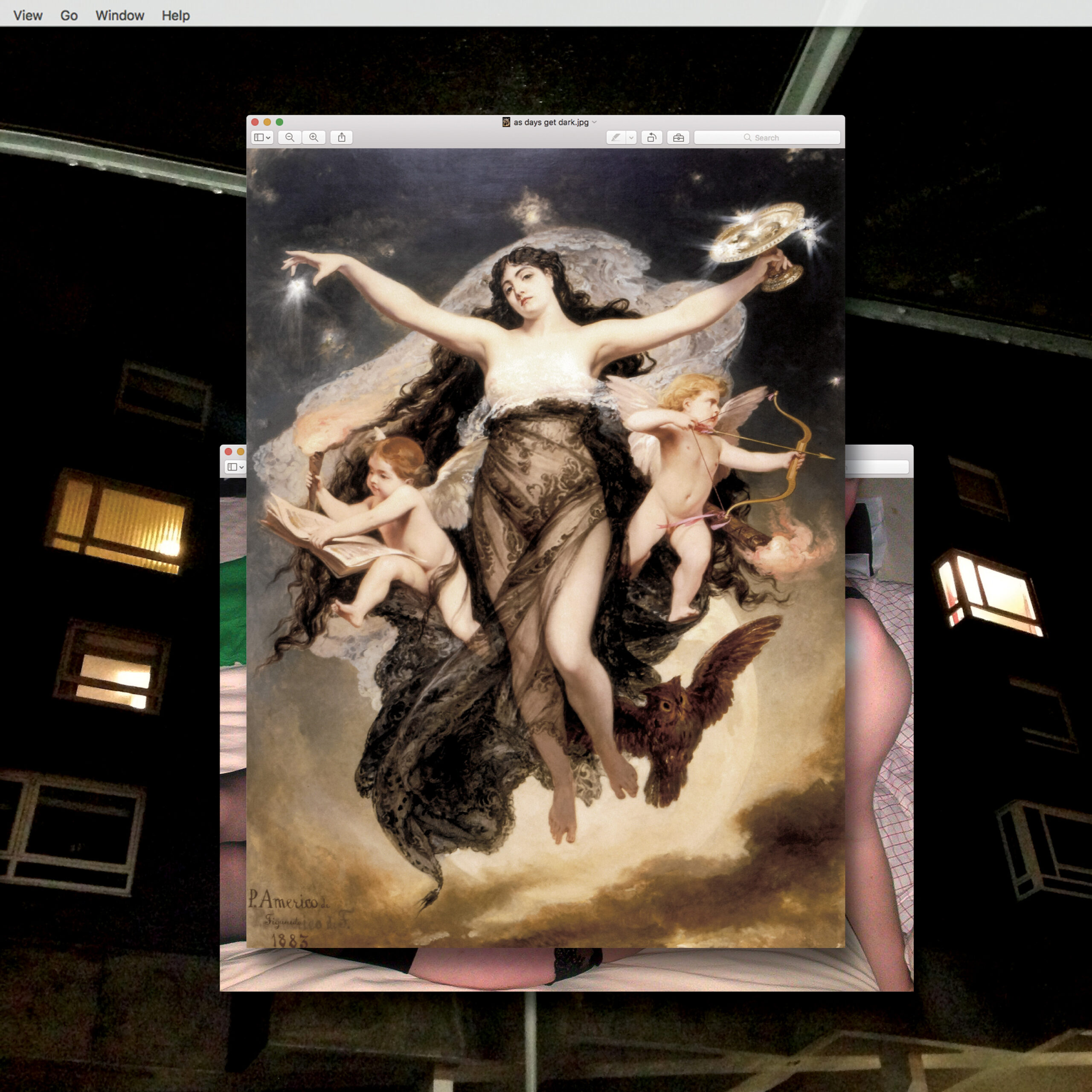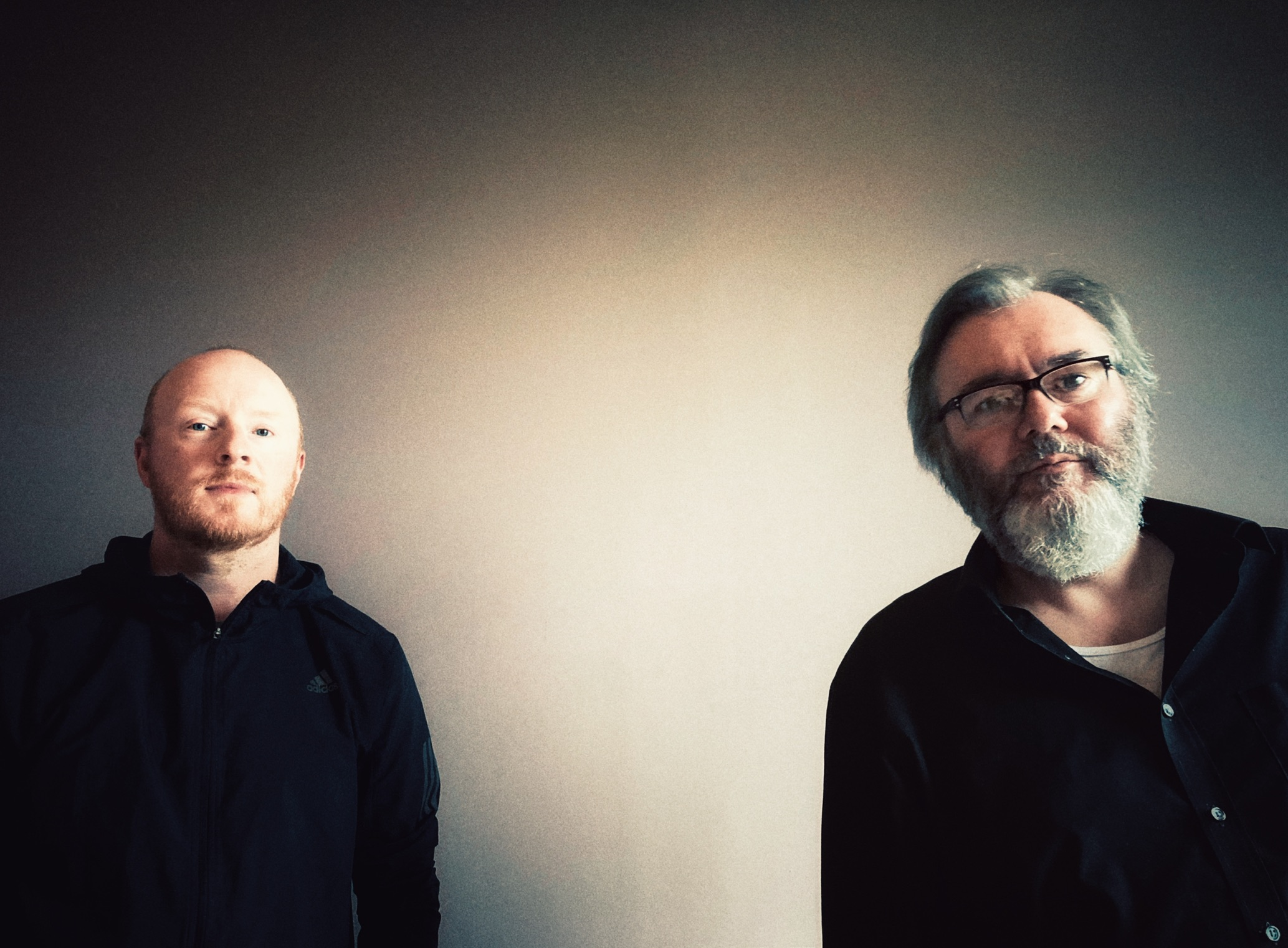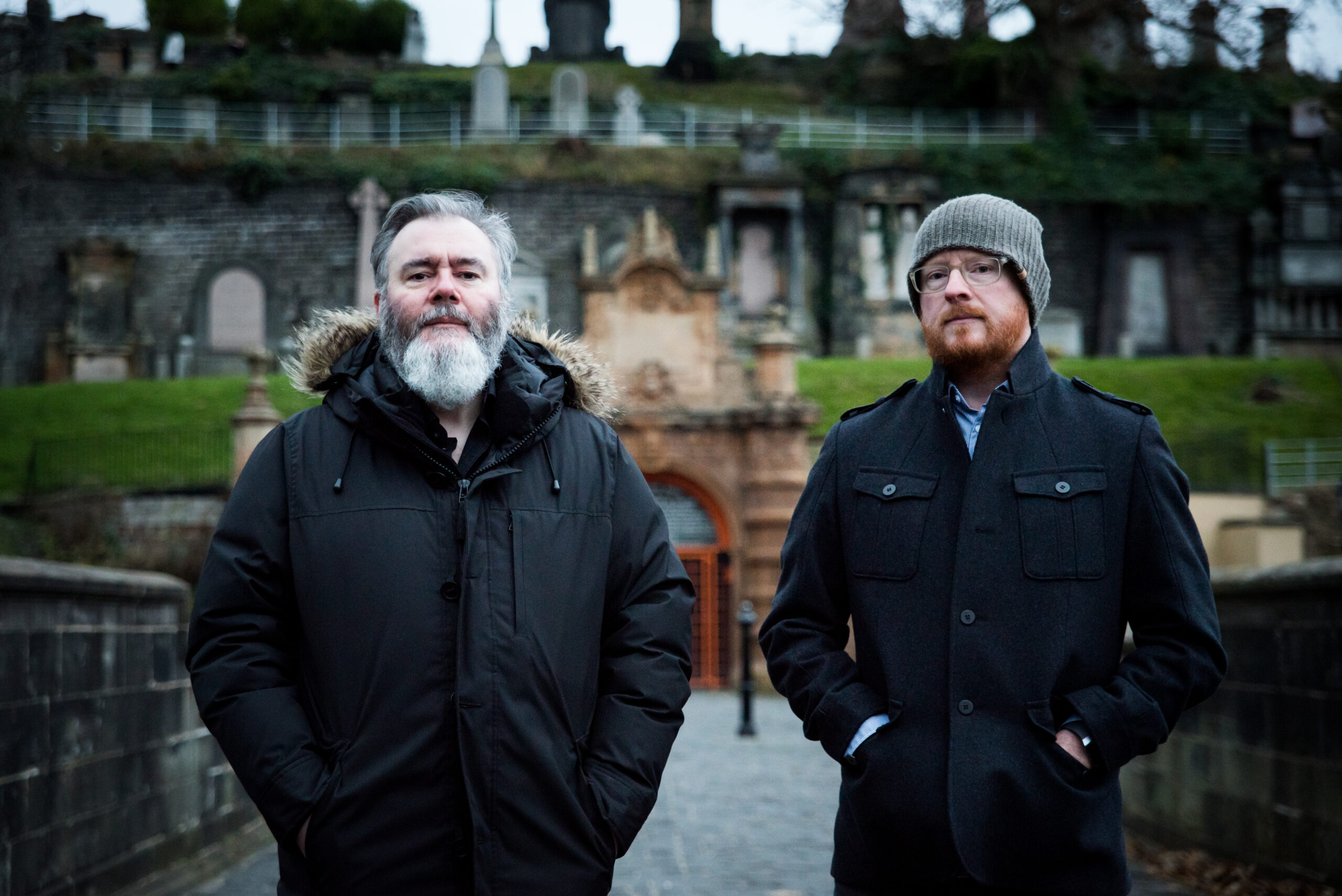Foto-© Kat Gollack
Wenn man die besten Bands aller Zeiten sucht, hat man es leicht. Einige davon fangen mit dem Buchstaben B an. Es gibt aber auch eine, die mit A beginnt, das ist Arab Strap. Gut ist schon einmal, dass es sich bei Aidan Moffat (Gesang, Drums) und Malcolm Middleton (Gitarre) um Schotten handelt. Das ist jener Menschenschlag im Norden Britanniens, der die großartige Sitcom Still Game hervorgebracht hat. In ihr sieht man zwei sympathische ältere Herren namens Jack und Victor. Letzterer hat in einer Folge einen ordentlich dicken Ständer, nachdem in der von beiden zur Verfügung gestellten Mercedes-Mietkarosse aus Platzgründen eine deutlich jüngere Frau auf seinem Schoß saß. Später spendiert der massive Rabauke Fergie the Ned einen Energy-Drink. Das Getränk verfehlt seine Wirkung nicht – vor lauter Feierlaune lassen die aufgemunterten Pensionäre den Lümmel angekettet und nackt vor einem Sozialwohnblock zurück. Das passt perfekt zum Geist von Arab Strap. Einst diktierte Aidan: „The kids never hear it like they should hear it. They should know of the farting, the fighting and the fucking. The pain and the pleasure.“
Bei Arab Strap ging es immer um Sex. Um Geschichten, die sich sonst keiner traut zu erzählen – in Deutschland nicht, und in England schon gar nicht. Das war auf dem Debüt The Week Never Starts Round Here im Jahr 1996 so, und es ist jetzt auf As Days Get Dark nach 15 Jahren Pause nicht anders. „I don‘t give a fuck about the past, our glory days gone by, all I care about right now is that wee mole inside your thigh“, heißt es in The Turning Of Our Bones gleich zu Beginn. Bei einer Megan Thee Stallion flutet alles ohne Scham, Punkt und Komma, bei Aidan klingt es mürrischer, nachdenklicher, aber doch auch humorvoll – so ein bisschen wie bei Leonard Cohen, nur schottischer. Und es gibt ein Happy End. „Just take my hand and be brave, we‘ll say goodbye to this grave, tonight we salsa, we rave, we are upcycled and saved!“ Wir finden das so gut, dass wir mit beiden sprechen mussten. Zur hellsten Tageszeit übrigens, nicht etwa zur finsteren Nachtstunde, in der bei Arab Strap gemeinhin die besten Ideen zu Musik und Text entstehen.

People see the new album as an indication for the band‘s comeback, but to some it‘s not surprising anymore. You‘ve played 2017 in Berlin at the Pop-Kultur Festival. What was it like?
Malcolm Middleton: We had a better sounding band and ten years to think about what we liked about being in a band the first time. We‘ve released our first album in 1996 and made more albums and toured every second year. You don‘t really stop to look at what you‘re doing and what you‘ve made after we‘ve split up and gone away. Then we‘ve absorbed the good parts of what we‘ve liked being in a band and came back and played shows in 2016/17. It was MK II, the band sounded better, we did stronger songs.
Aidan Moffat: I remember when Arab Strap played the last gig in Glasgow before we split up in 2006. I loved it and thought: Why can‘t we do more of this? (laughs) When I‘ve been playing gigs on my own I got more confident when I perform. It seemed more like a full-on experience, and as Malcolm said we‘re a much stronger band since we came back.
It was different in the nineties and noughties, you‘ve been on the infamous writing-releasing-touring-roll all the time. Now you had two years of preparation until you could say: This is the new record.
MM: It didn‘t seem like two years, we had our projects on the side and sent ideas back and forth. But it‘s similar to our first album, the fact that no one was expecting this, there was no pressure from labels or anyone to hear songs. We would release it when we had songs that were strong enough, which is like your first album. You‘ve got your whole young life to record your first album and then six months to do a second one. Now we had the whole second part of our lives to do this record.
AM: We were both touring as well. We still had other records out, Malcolm had a solo record and I had one with RM Hubbert. It was more a case of us doing it in our spare time. There was no rush, we were just going to do it and see what we‘ve got to.
Since you‘ve mentioned Robert Hubbert, you‘ve worked with him, The Best-Ofs and Bill Wells in the intervening years. Compared to them, what does Malcolm bring to a project the others haven‘t got?
AM: For it‘s pretty much the same way I work with everyone. I don‘t tend to write until I have the music to work with. I like to respond to music. If I write with someone it usually starts with a melody or a guitar part. In the case of Arab Strap it normally starts with a wee drum loop, but most of the time it starts with the music. We bounce it back and and forth and find something that suits, we never discuss it. It‘s not a process where we analyze everything or speak about what we‘re trying to achieve. We use our instincts until we find something that we both like.
There are a few things on the new record that go beyond the routine. The whiff of a guitar solo Malcolm plays a the end of Tears On Tour is a good example. It sounds very Knopfler-esque, very classic rock. Are you happier than ever to do something people don‘t expect?
MM: Well, maybe we‘ve never done it on recordings before, but it definitely happened a lot when we played live. The reason it is on this album is because of lockdown. We were in the studio for three weeks last March, then we went back into the studio in August. We worked separately on a few days, I did the guitar one day and Aidan did the drums and vocals another day – so it‘s on there because Aidan wasn‘t in (AM laughs). I took my freedom, but it‘s a taste thing as well. There is a very fine line between ironic and iconic, I think I managed to walk that line with that song. (laughs)
AM: Those sort of things happened on stage when I wasn‘t there.
MM: You were on the toilet when that stuff happened.
AM: That‘s true, I‘ve gone away for a pee, that‘s when all the magic happens. (laughs)
MM: It‘s a funny and sad song at the same time. It‘s called Tears On Tour, but there‘s also humour. I was just trying to sonically capture Aidan‘s emotions.
Here Comes Comus! is probably the song the people at Go! Beat Records wanted when you recorded your only major album Elephant Shoe for them. It‘s a celebratory track with a big chorus, named after the god of festivity in Greek mythology. Since your own project Nyx Nótt is named after two goddesses of the night, Aidan, are you more interested in divine figures than ever?
AM: No, it just pops up every now and then. The Nyx Nótt thing came from trying to find a reference for night time. I wanted it to sound like a real name. The Comus thing came up as an idea. The Greeks and Romans were good at having gods simply to blame for the thing they did wrong…(laughs)…they would be seduced by Comus and various others, they had a god for nearly every mistake they made really. I find that quite fascinating. There‘s not a lot about Comus, it‘s quite hard to find any stories about him. John Milton wrote a play about Comus, but generally speaking he‘s a pretty underground god. He was quite a lesser one, but I think he seemed pretty powerful.

Musically Here Comes Comus! is similar to certain electro-pop numbers in the 80s, it sounds pretty futuristic compared to other Arab Strap songs. Why did this style fit perfectly in this particular case?
AM: It all came about because I hated the drums (laughs). It had live drums to start with and it just sounded a bit too indie rock or something, so I replaced all the drums with 80s drum samples, and I think that gave it a wee bit more…I mean I like that Sunglasses At Night sound in general, yeah….I‘m happy to admit that (laughs).
When you started back in day you‘ve been very much influenced by post rock made by the likes of Slint, Smog or Palace Brothers. What inspires you today when you write an Arab Strap song?
MM: We both have different tastes, that‘s quite important. I listen to quite a lot of pop music and heavy metal. I like Miley Cyrus this week, I like Grimes and Slayer.
AM: That‘s Arab Strap in a nutshell….(laughs)…I listen to a lot of things, I don‘t think there‘s one thing that influences the way we sound…
MM: The one thing we both like, we both love choruses and hooks.
AM: Yeah, I do love those, but there are other things as well for me. I think we try to do our best to sound as least like anyone else as we can. If there are any influences, they do seem to be kind of buried. Most of the music I listen to right now is nothing like Arab Strap, it‘ll be quieter or acoustic stuff. Keeley Forsyth put out an album I really like, I was listening to Eric Satie‘s piano pieces the other day, all I‘m listening to is quite relaxing music, I don‘t rock out in the house much…(laughs)
On your early albums you‘ve created mood pieces, lyrically is was more of a story than a song with a verse-chorus-verse structure. Now the chorus is nearly everywhere. Is that a result of a learning process?
MM: It wasn‘t planned. I think Aidan hasn‘t done that many choruses recently, so even if I haven‘t got a chorus musically he‘ll put one in lyrically. It all came out on this record. I didn‘t put the choruses into Sleeper or Bluebird, he did that himself.
AM: When we were making the old records, I didn‘t think I could do it with the voice that I‘ve got. I mean, I‘m not by any stretch a good singer, but I think I‘m a better singer than I was and you can tell what I‘m getting at now. Before I couldn‘t, like Malcolm says with Bluebird, I would have never even tried to write that wee bit of chorus for that song before, because I don‘t think I could have pulled it off 15 years ago. I think it‘s just having a bit more confidence in what I do with my voice. But there will no choruses on the next one, just drones and sexy stories…(laughs)….

What kind of influence did the pandemic have on the writing and recording of the new Arab Strap album?
AM: The making of the record wasn‘t really affected. Last March or April we knew we had to cancel the studio dates, but we‘ve written and recorded most of it by then anyway, so it didn‘t make much difference. But even if we had written it last year, we would have done it exactly the same way. We‘re working online, we don‘t sit in a room together and try to write a song. We send each other parts and bounce it back through Dropbox and do it that way.
MM: That‘s the same way we did it 25 years ago. We started off passing cassette tapes and stuff and we never sat in a room together writing a song. We wrote bits for a song, then we‘d go to the studio and work on it from there.
AM: When I first moved to Glasgow you used to post me cassettes when we made an album. I‘d sit in front of a cassette player with maybe ten guitar parts and imagine something. These days you can send me a guitar part as a wav file. We don‘t need to use our imagination before we get to the studio now because we can actually just do it. It‘s a different process. We used to write and record a lot in the studio and just make it up on the spot, but now when we get there we‘ve got everything pretty much panned out.
MM: But as for the pandemic affecting us, I don‘t think it has musically. When we‘re not touring we‘re normally at home and writing anyway. I had lots of time writing other things since the Arab Strap record was finished, so it‘s been a creative because we‘ve got time on our hands. We both did homeschooling with the kids, but then it‘s the same as it always is working from home.
AM: I‘ve been trying to catch up with things like old ideas I‘ve never got around to finish. It‘s the only way to keep sane I think, to keep being busy and working on something. I‘m very lucky I have a brilliant job, it‘s actually more like having a holiday. I find writing songs and working on music really relaxing and good for the mind.
You sound very upbeat today, which doesn‘t go hand in hand with what people think about you and the band. You‘ve often complained about the fact that people see you as a miserable person because of your vocal performance. What are you doing against that narrowing kind of perception?
AM: You can‘t really control the way people think about you. It was different back then too. When we first started there were only two music papers that came out really that had any influence, the NME and the Melody Maker in the UK. They were very quick to pigeonhole you. I can forgive people for hearing some Arab Strap songs and thinking that they‘re a pretty dour act.
MM: Our first single was about a three-day party, come on!
AM: Yeah, and every one after is about the hangover…(laughs)…
Well, you‘ve released a song in 1997 called Hey!Fever which sounds very happy with a kind of choir and a dance beat. I‘ve still got it.
AM: Yeah, it was a really good week in the studio and the sun was shining. I‘m not sure where that one came from (laughs).
MM: That‘s what happens when we‘re in studio and happy – we‘re coming up with rubbish like that. So it‘s fair to be miserable if we go in.
AM: All I remember about Hey!Fever is that John Peel didn‘t like it, I was always quite upset about that. He never played it, he couldn‘t stand it. I like the b-side Girls Of Summer, the live version is much better than the one on record. It‘s a completely different beast these days, it‘s one of the best ones to play certainly.
Now to something more political. Is it inevitable in this day and age for you as British songwriters to write lyrics as the ones in Fable Of The Urban Fox?
AM: I think it‘s impossible not to be affected by it now. The big difference between us now and us then is the world around us is completely transformed by the internet. Obviously we had the internet in 2006, but we didn‘t have social media in the way we have now. Public opinion and the papers weren‘t so transparently biased and working for the government. That‘s the thing, you can‘t avoid being political in one sense, there‘s nowhere to go, you can‘t escape it. These days I feel like I‘ve been driven to it by a situation that is a total disaster. Hopefully by the time we tour Europe there will be an agreement in place, but even if we do get a Schengen visa, the costs will still be blown up. Even the travel costs, we have to travel one extra day before, because we can‘t get into the countries quickly now. So aye, everybody has to be a wee bit more engaged than they used to be. It‘s also because I‘m older too, you get more concerned about those things as you‘re older and you have children. I mean, I grew up in the 80s when we had Margaret Thatcher, and this is worse! She had principles and she was scary, but this lot don‘t have principles. They don‘t care, they‘re the most transparently corrupt government we ever had. So aye, fun times, fun times.










